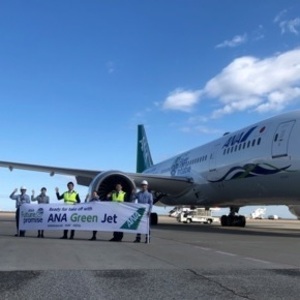ANA to use SAF produced by Neste on domestic flights

November 15, 2022
BY All Nippon Airways
All Nippon Airways, Japan's largest and 5-Star airline for nine consecutive years, announced its second ANA Green Jet will enter service on regular scheduled domestic flights. To commemorate its inaugural take off, ANA will use sustainable aviation fuel (SAF) on the aircraft, marking the first time ANA will use SAF produced by Neste on domestic flights.
"To be able to use mass-produced SAF for domestic flights is an exciting step toward reducing our carbon emissions and achieving our sustainability goals," said Shinichi Inoue, president and CEO of ANA. "In addition, with the use of the ANA Green Jet on domestic routes to raise awareness of SAF with our customers and the public, ANA hopes to be a leader in the industry and inspire others to follow suit."
The second ANA Green Jet began service on November 14 on the Tokyo Haneda-Fukuoka route. The aircraft will feature the same technologies and services as the first ANA Green Jet that took flight for international routes on Oct. 5, 2022, such as a special material with riblet texture which is expected to have a "shark skin effect" in which ANA will study the decrease in air resistance and CO2 emission reduction of the aircraft.
Advertisement
Advertisement
In 2020, ANA became the first Japanese airline to enter into a mid-to-long-term procurement agreement with Neste. Since then, ANA has regularly procured SAF from Neste, the world's leading producer of renewable diesel and sustainable aviation fuel, for use on scheduled international flights departing from Japan.
SAF produced by Neste is made from sustainably sourced, renewable waste and residue raw materials. Typically, in its neat form and over the lifecycle, it can reduce up to 90 percent of greenhouse gas emissions compared to fossil jet fuel. The fuel gives an immediate solution for reducing the direct greenhouse gas emissions of flying. It can be used as a drop-in fuel with existing aircraft engines and airport infrastructure, requiring no extra investment.
Advertisement
Advertisement
The ANA Group has set a goal of replacing at least 10 percent of its jet fuel with SAF by FY2030 and of becoming carbon neutral by FY2050, and is taking a variety of measures to expand the use of SAF. As a leading airline in Japan, we will continue to proactively work to incorporate initiatives to reduce CO2 emissions and contribute to delivering solutions to environmental issues.
Related Stories
The U.S. Energy Information Administration maintained its forecast for 2025 and 2026 biodiesel, renewable diesel and sustainable aviation fuel (SAF) production in its latest Short-Term Energy Outlook, released July 8.
XCF Global Inc. on July 10 shared its strategic plan to invest close to $1 billion in developing a network of SAF production facilities, expanding its U.S. footprint, and advancing its international growth strategy.
U.S. fuel ethanol capacity fell slightly in April, while biodiesel and renewable diesel capacity held steady, according to data released by the U.S. EIA on June 30. Feedstock consumption was down when compared to the previous month.
XCF Global Inc. on July 8 provided a production update on its flagship New Rise Reno facility, underscoring that the plant has successfully produced SAF, renewable diesel, and renewable naphtha during its initial ramp-up.
The USDA’s Risk Management Agency is implementing multiple changes to the Camelina pilot insurance program for the 2026 and succeeding crop years. The changes will expand coverage options and provide greater flexibility for producers.
Upcoming Events










